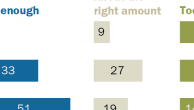
Americans’ Views on Who Influences Health Policy and Which Health Issues To Prioritize
About seven-in-ten Americans say insurance companies have too much health policy influence, but partisans disagree on the CDC’s role.
Numbers, Facts and Trends Shaping Your World
Research Associate
Giancarlo Pasquini is a research associate focusing on science and society research at Pew Research Center.
About seven-in-ten Americans say insurance companies have too much health policy influence, but partisans disagree on the CDC’s role.
These groups are far apart in their enthusiasm and predictions for AI, but both want more personal control and worry about too little regulation.
Just over half of U.S. adults (53%) say they’ve gotten neither the flu shot nor the updated COVID-19 vaccine since last August.
Nearly three-quarters of U.S. adults (72%) say the COVID-19 pandemic did more to drive the country apart than to bring it together.
Democrats and those who lean to the Democratic Party are more likely than Republicans and Republican leaners to say they will get an updated COVID-19 vaccine.
Half of Americans or more say they are extremely or very comfortable talking about their mental health with a close friend, an immediate family member or a mental health therapist.
Just 20% of the public views the coronavirus as a major threat to the health of the U.S. population and only 10% are very concerned about getting a serious case themselves. In addition, a relatively small share of U.S. adults (28%) say they’ve received an updated COVID-19 vaccine since last fall.
The share of Americans who say climate scientists understand very well whether climate change is occurring decreased from 37% in 2021 to 32% this year.
As the Earth’s temperature continues to rise, climate change remains a lower priority for some Americans, and a subset of the public rejects that it’s happening at all. To better understand the perspectives of those who see less urgency to address climate change, the Center conducted a series of in-depth interviews designed to provide deeper insight into the motivations and views of those most skeptical about climate change.
About nine-in-ten (88%) Americans say, overall, the benefits of childhood vaccines for measles, mumps and rubella outweigh the risks, identical to the share who said this before the coronavirus outbreak. U.S. adults are less confident in COVID-19 vaccines: Fewer than half rate them as having high health benefits and a low risk of side effects.
Notifications
